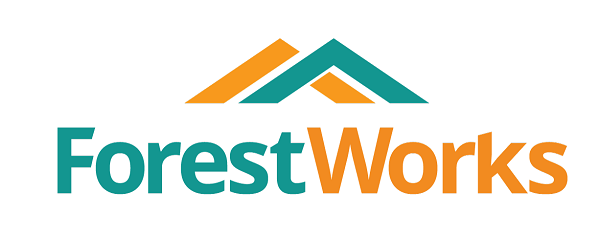The following training package projects for the forest, wood and timber industry and pulp and paper industry have now been finalised.
The revised qualifications, skill sets, units and companion volumes that were developed as part of these projects are published on training.gov.au and available for delivery by registered training organisations (RTOs).
Further details about individual projects are available below.
Forest, Wood and Timber Industry
The qualifications, skill sets and units for the forest, wood and timber industry have been grouped under the FWP Forest and Wood Products Training Package, along with a Companion Volume to assist RTOs with implementation.
Please see below for a list of completed projects within the training package.

As the sawmilling and timber processing sectors undergo rapid digital transformation and technical progress, new skills are being developed to work with new technology and products. This has required operators, line technicians, and production supervisors to develop updated expertise, to support quality processes, problem solve and perform some types of equipment maintenance. Skills are also required in communication, decision making and teamwork, as well as in supporting work health and safety and the environment. As part of this project, qualifications, skill sets and units of competency for timer and wood production have been redeveloped to be more flexible in structure and reflect the practical skills required. The Certificate III in Timber and Wood Products Operations has been updated to offer specialisations in timber production, glue laminated timber or cross laminated timber production, plywood or laminated veneer lumber production, or reconstituted wood panel production. The Certificate IV Timber and Wood Products Operations has been updated to support future production supervisors and technicians with the skills necessary to manage technical operations, production issues, performance, equipment maintenance, and quality and safety requirements of a timber or wood products operation. Eight skill sets have also been developed to further enhance flexibility and serve as entry pathways into critical jobs, such as saw technicians and wood machinists, and programs to train future leaders. The final draft qualifications, skill sets and units have been endorsed by the Australian Industry and Skills Committee (AISC) and will now be forwarded to State and Territory Skills Ministers for approval.
For detailed information, visit the project webpage.
The updated qualifications, skill sets and units were be published on the national training register (training.gov.au) within the FWP Forest and Wood Products Training Package. They are available for use by registered training organisations (RTOs) along with the Companion Volume Implementation Guides.
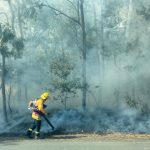
The Federal Government’s Royal Commission into National Natural Disaster Arrangements brought attention to how forestry operators, arborists and other service providers play a crucial role in clearing and clean-up following bushfires. This is a high-risk activity that requires skills in communication and making rapid assessments about tree health and potentiation hazards. Guided by a group of subject matter experts made up of workplace and industry experts, units were developed as part of this project to support safer and more efficient post-bushfire vegetation clearing and clean-up operations. The units developed describe how to use communication protocols and structures while conducting tasks in a bushfire zone and how to perform tree hazard assessment according to national standards. In addition, four units for chainsaw operations were revised so that they can be delivered and assessed by non-forestry sectors without changing the learning outcomes. The final draft units have been endorsed by the Australian Industry and Skills Committee (AISC) and will now be forwarded to State and Territory Skills Ministers for approval.
For detailed information, visit the project webpage.
The updated and developed units were published on the national training register (training.gov.au) within the FWP Forest and Wood Products Training Package. They are available for use by registered training organisations (RTOs) along with the Companion Volume Implementation Guides.
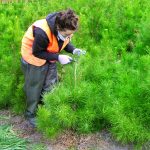
New entrants to the forestry industry are needed to keep up with demand for forest products and deliver on government commitments to plant more trees. Local and global markets continue to seek out a range of products, from new wood-fibre based plastic alternatives to the softwood used to build new homes. Meeting this demand in a sustainable way is a key focus of industry and governments, with the Australian Federal Government committed to planting a billion trees over the next decade, in addition to the 70 million trees already planted each year. As a result of this project, industry now has access to updated national entry level qualifications that better support learners’ career paths and reflect practical skills. Four qualifications at the AQF level 2 and 3 were consolidated into one qualification at each level, resulting in a Certificate II in Forest Operations and a Certificate III in Forest Operations, with specialisations in forest nursery production, silviculture and timber harvesting and haulage.
Skill sets and units were developed to support career pathways and address skills gaps. Existing skill sets and units were revised to reflect job roles and work tasks and to improve learning outcomes.
For detailed information, visit the project webpage.
The qualifications, skill sets and units were published on the national training register (training.gov.au) on 28 January 2022, within the FWP Forest and Wood Products Training Package. They are available for use by registered training organisations (RTOs) along with the Companion Volume Implementation Guides.
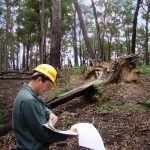
Skilled management, supervision and planning are integral skills for growing sustainable forests for timber, wood and fibre products. High level expertise is required for maintaining safe work practices, improving forest health, optimising forest management practices And working with the latest technology. As a result of this project, the Diploma of Forest and Forest Products and Certificate IV in Forest Operations which support high level forestry skills have been updated so that industry can access the skills it needs to lead it into the future. Thanks to everyone involved in this project, forest operations supervisors, forest contractor business managers and early career foresters have access to updated, industry-developed, practically focused and flexibly structured qualifications. Two qualifications, the Diploma of Forest and Forest Products and Certificate IV in Forest Operations, were reviewed to support the current skills requirements of the forest industry and provide a flexible structure for learners. Forty-six units of competency underwent minor adjustments and updates. Sixteen units were developed to address skills gaps related to management systems, forest resource management and forest operations management. Some units and qualifications were merged or deleted to reflect skills needs and streamline delivery.
For detailed information, visit the project webpage.
The qualifications, skill sets and units were published on the national training register (training.gov.au) on 28 January 2022, within the FWP Forest and Wood Products Training Package. They are available for use by registered training organisations (RTOs) along with the Companion Volume Implementation Guides.
For detailed information, visit the project webpage.
The revised qualifications, skill sets and units were published on the national training register (training.gov.au) in within the FWP Forest and Wood Products Training Package. They are available for use by registered training organisations (RTOs) along with the Companion Volume Implementation Guides.

Forest harvesting and haulage contractors work in remote areas, requiring a safety mindset that accounts for the impact of an isolated working environment, including the implications for mental health and the fact that some areas may not be easily accessed by rescue teams. Leadership skills are essential to reinforce safe practices and promote and shape a safety culture in the workforce. As a result of the contributions made to this project, the forest industry has access to national skills standards that will help foster a safety culture and practices among workers in remote forest operations. Two units were developed which describe the skills and knowledge required to apply situational awareness and a safety mindset while working in team situations or alone, in isolation or out of line of sight.
For detailed information, visit the project webpage.
The units were published on the national training register (training.gov.au) on 28 January 2022, within the FWP Forest and Wood Products Training Package. They are available for use by registered training organisations (RTOs) along with the Companion Volume Implementation Guides.

Timber trusses and frames play an essential role in many modern homes and other buildings, as a key structural element supporting the weight of the building, as well as roofing including solar, air conditioning or hot water units, and providing surfaces for a wide range of cladding technologies. It is the responsibility of timber systems fabricators and designers (estimators) to work together to produce structurally sound trusses and frames for building construction. While the roles of timber systems designers and fabricators both require the ability to read plans, work as a team, and follow appropriate health and safety practices, distinct skills are needed for each position. Industry has driven this project to review the current skills standards for timber truss and frame estimating and manufacture so that they reflect the distinct skills requirements for job roles in Australia. This has resulted in the update of three qualifications and 25 units of competency and the development of five new skill sets and one new unit of competency. They have been updated to broaden entry requirements and improve consistency.
For detailed information, visit the project webpage.
The reviewed and developed skills standards were published on the national training register (training.gov.au) on 4 December 2020 within the FWP Forest and Wood Products Training Package. They are available for use by registered training organisations (RTOs) along with the Companion Volume Implementation Guides.

Construction businesses and individual consumers alike are dependent on the expertise of the timber supply industry for facilitating advisory and sales services specific to timber. Providing an integral step in the supply chain, timber supply businesses require their employees to have skills in timber advice, customer service, sales, purchasing, and managing sales accounts. Just as important in carrying out this work is knowledge of different timber types, along with technical skills to measure and cut wood, and correct practices for storage, dispatch and transport of goods. As a result of the project, an updated qualification will support all specialist jobs in the timber building supply sector from timber yard and warehouse operators to transport and dispatch coordinators and customer advisors and sales officers. It enables specialisations in timber warehousing, logistics, or customer advice and sales.
For detailed information, visit the project webpage.
The reviewed and developed skills standards were published on the national training register (training.gov.au) on 4 December 2020 within the FWP Forest and Wood Products Training Package. They are available for use by registered training organisations (RTOs) along with the Companion Volume Implementation Guides.
The updated qualifications, skill sets and units were be published on the national training register (training.gov.au) within the FWP Forest and Wood Products Training Package. They are available for use by registered training organisations (RTOs) along with the Companion Volume Implementation Guides.

The forestry industry is becoming safer, more environmentally sustainable and more productive thanks to the use of new technologies such as digital maps, forest operation plans, and new harvesting systems. Mapping and evaluating forests is increasing in efficiency and accuracy as a result of drones and remote sensing methods. Developments in techniques for cable logging and tethered harvesting mean a higher degree of safety and efficiency when working on steep slopes. As a result of consultation throughout this project, the skills needed to perform harvesting activities using new technologies were captured in five new units of competency. The project also reviewed and updated 25 units across the forest harvesting sector, so that they are up to date with current work practices, safety standards, and equipment. They also reflect the skills required by harvesting machine operators who are involved in winch assisted harvesting and forestry site preparation on steep slopes. The skills needed to use chainsaws within a tree when conducting tree trimming or dismantling work were also defined.
For detailed information, visit the project webpage.
These reviewed and developed skills standards were published on the national training register (training.gov.au) on 4 December 2020, within the FWP Forest and Wood Products Training Package. They are available for use by registered training organisations (RTOs) along with the Companion Volume Implementation Guides.
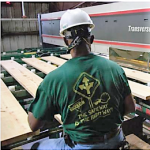
The timber processing industry is part of a sophisticated and integrated supply chain whose products are in strong demand from the Australian housing construction industry. Technological advancements and market demands have had a significant impact on how jobs are performed in the sector, particularly for wood machinists and saw technicians (traditionally known as saw doctors). As a result of the project and the numerous industry representatives who volunteered their time and expertise, the qualifications which underpin apprenticeships in wood machining, saw technology and wood processing have been updated to reflect current practices, equipment and terminology. As these skills are relevant across the sector, this project took place in conjunction with the Sawmill Timber and Process Optimisation Project.
For detailed information, visit the project webpage.
The reviewed and developed skills standards were published on the national training register (training.gov.au) within the FWP Forest and Wood Products Training Package. They are available for use by registered training organisations (RTOs) along with the Companion Volume Implementation Guides.

Virtually all job roles in large softwood sawmills are expected to integrate principles of timber and process optimisation to maximise the overall volume and value of timber recovery. In recent years, new job roles have also emerged in the softwood processing sector, such as optimisation managers and optimisation technicians. These roles focus on process improvement across an enterprise’s operations, using optimisation software to process information from a range of scanning technologies. In order to help the timber industry adapt to these changes, units of competency have been developed and revised to support production efficiencies in sawmills. As these skills are relevant across the sector, this project took place in conjunction with the Advances in Wood Machining and Sawdoctoring Project.
For detailed information, visit the project webpage.
The reviewed and developed skills standards were published on the national training register (training.gov.au) within the FWP Forest and Wood Products Training Package. They are available for use by registered training organisations (RTOs) along with the Companion Volume Implementation Guides.

Growing building construction activity and use of timber as the dominant structural material has been a notable driver for timber products demand, particularly the new generation of engineered wood products – cross-laminated timber (CLT) and glulam. Capital investments in new processing and manufacturing plants for CLT and glulam have also increased, requiring a workforce with specific skills to operate machines and computer numerical control (CNC) equipment and to manage different stages of the production processes. Industry was consulted throughout this project to review and update 21 units of competency relating to CLT and glulam production, to incorporate the skills and knowledge that are required to operate machinery and accurately describe all job functions. Four new units were also developed in conjunction with the Prefabricated Timber Building Systems Project, in the area of design, manufacture and installation of prefabricated timber building systems, involving Cross Laminated Timber (CLT) and Glulam among other components.
For detailed information, visit the project webpage.
The final units were published on the national training register (training.gov.au) on 18 December 2018 within the FWP Forest and Wood Products Training Package. They are available for use by registered training organisations (RTOs) along with the Companion Volume Implementation Guides.

To keep up with strong demand for building materials, the forest and wood products industry has been innovating new products and processes, such as panelised building systems and updated manufacturing processes As a result, industry requires updated skills, including to operate Computer Numerical Control (CNC) equipment, use tools for on-site product installation, manage prefabrication processes and provide advice regarding product conformance. Industry were consulted throughout this project to review and update units of competency for timber truss and frame design and manufacture to reflect these emerging industry skill requirements, including prefabrication of panelised building systems, so that all job functions are accurately described. Four new units were also developed in the area of design, manufacture and installation of prefabricated timber building systems, in conjunction with the Cross Laminated Timber Building Systems Project.
For detailed information, visit the project webpage.
The final units were published on the national training register (training.gov.au) on 18 December 2018, within the FWP Forest and Wood Products Training Package version 4. They are available for use by registered training organisations (RTOs) along with the Companion Volume Implementation Guides.

Advances in optimisation technology are offering the opportunity for forestry operations to be more productive and efficient and to minimise the amount of waste produced in the process. Industry identified the need for this project to update the skills standards for forest harvest optimisation so that they are in line with recent technological improvements. As a result, two new units of competency for the use of on-board optimisation systems and computers in mechanical harvesting were developed. Ten existing units were also reviewed and updated to reflect technological change and to incorporate best practice principles in forest harvest operations.
For detailed information, visit the project webpage.
The revised qualifications, skill sets and units were published on the national training register (training.gov.au) in within the FWP Forest and Wood Products Training Package. They are available for use by registered training organisations (RTOs) along with the Companion Volume Implementation Guides.
Pulp and Paper Industry
The skills standards and qualifications for the pulp and paper industry have been grouped under the PPM Pulp and Paper Manufacturing Training Package, along with a Companion Volume, to assist RTOs with the implementation.
Please see below for a list of completed projects within the training package

The pulp and paper industry produces many essential goods used across a variety of settings, from households, offices, and public buildings to hospitals, medical practices and food outlets. A commitment to improving the sustainability of the industry has seen innovations in areas such as bioenergy, biomass and biodegradable packaging. As industry adopts new technologies and comes up with new products in response to consumer preferences, the skills required for this work are changing. This project comprised an update of all qualifications, skill sets and units of competency within the PPM Pulp & Paper Manufacturing Industry Training Package. The qualifications were redesigned and merged from seven to four, so that there is one qualification at each Australian Qualification Framework (AQF) level, reflecting current job roles and supporting learners to develop a broad understanding of plant operations. Problem solving skills, work health and safety, and quality assurance skills were included as core skills across all qualifications. Common skills standards across production were identified and 23 units merged into 11. Skills for operating emerging technologies were incorporated into existing units. Some new units and skill sets were developed to address skills for entering the industry, working in management or overseeing roles, and for working with technologies involved in de-inking operations. Units and skill sets were deleted where the skills standards could be better met by a new or existing unit or skill set.
For detailed information, visit the project webpage.
The updated qualifications, skill sets and units of competency were published on the national training register (training.gov.au) on 11 February 2022, within the PPM Pulp & Paper Manufacturing Industry Training Package. They are available for use by registered training organisations (RTOs) along with the Companion Volume Implementation Guides.
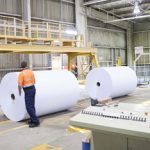
High level skills are required for safely working at a pulp and paper manufacturing site, including skills for working with hazardous chemicals, extreme heat and steam, and large machinery. Many pulp and paper manufacturing sites are recognised by Worksafe Australia as major hazard facilities. It is crucial that the training package reflects the requirements set out to maintain that licence, as well as the regulations and codes of practice set out in other legislation. Consultation took place throughout this project to review and update units of competency so that they reflect workplace health and safety requirements for working in major hazard facilities and for a range of specialist paper making and pulping processes.
For detailed information, visit the project webpage.
The final qualifications, skill sets and units of competency were published on the national training register (training.gov.au) on 24 October 2018, within the PPM Pulp & Paper Manufacturing Industry Training Package version 2. They are available for use by registered training organisations (RTOs) along with the Companion Volume Implementation Guides.
